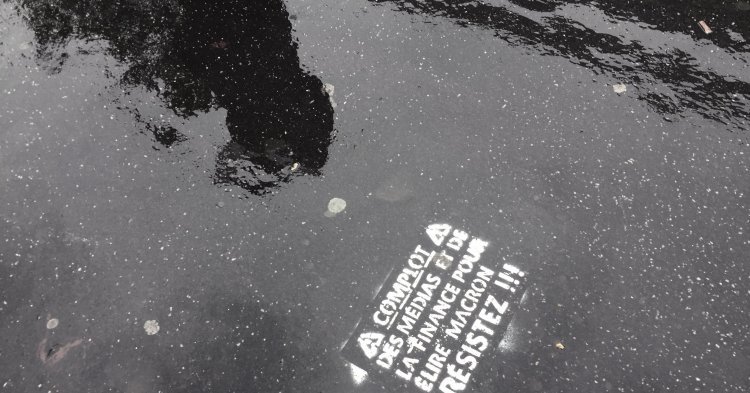Poland or Hungary may be the trees which conceal the forest. Fading democracy is a Europe-wide problem and concerns a vast share of the EU’s Member States. Brexit has revealed how the democratic debate has been flouted, and how the British voters have been deceived when they decided on such a complex issue. Germany is becoming one of Europe’s hotbeds for a far-right extremism which is threatening its post-reunification social and democratic consensus. But one of the country most affected by a long-term misfunctioning of democratic principles might be France.
Don’t get me wrong. France is a great country to live in, a democracy where elections are free and fair, and where the public space is relatively dynamic.
But France is not a “full democracy”, it is a “flawed democracy”. Different international rankings have been showing this for years (in particular in 2016 and 2018), and despite the subjectivity of some criteria used, the country does, indeed, have a deep and serious problem of representativity. The structure of the “semi-presidential” and hyper-centralized state, as well as a broken social ladder, especially affecting those young people, often of migrant origin, living in the infamous “banlieues”, are the reasons why more and more French citizens do not feel properly represented by democracy, and are increasingly attracted by authoritarian tendencies.
The concept of “Monarchie républicaine”
I belong to those who think that the state’s very structure is largely responsible for the current situation. France is what we call a “semi-presidential” regime: a form of government where there exists a cohabitation between a powerful President and a government, led by a Prime Minister, which is politically accountable to Parliament. France is one of the five semi-presidential regimes in the EU, along with Poland, Romania, Lithuania and Portugal.
The French President holds considerable power and is often described as the “most powerful political man in Europe”, or, at least, the “least accountable political man in Europe”. Indeed, he (or she, although France has never had a female president) is not accountable to the French bicameral Parliament. As we say in the somewhat pompous official statements “the President is only accountable to the people”. A motion of no confidence from the Parliament could only force the government to step down, not the President. The concept of “Monarchie républicaine” has been forged - and is not without its irony, since France is known for having beheaded one of its last kings.
When the “presidential will” is a decisive factor in the understanding of any country’s current politics, something is seriously wrong. And aside from the (very marginal) cases where a government has come from a party different to president’s (this “cohabitation” has virtually disappeared with the constitutional reform of 2000, setting up a five-year presidency), the President and its parliamentary majority barely need to negotiate with the opposition when passing laws.
The latest developments surrounding the ongoing pension reform have shown this very well: due to a lack of negotiation with opposition parties, positions have become more polarised. The far left submitted dozens of thousands of amendments in a blatant attempt to obstruct the law-making process. To handle this, the government decided to force the adoption of the reform, using a constitutional tool described in the Article 49, paragraph 3, of the Constitution [1] (hence the expression le 49.3 when referring to it). This “legislative nuclear weapon” has been used many times in the last decades - and it is this refusal to engage in debate which most harms democracy.
For a long time, I have thought that a powerful president elected through a two-round election process was a bulwark against growing far-right extremism (the famous “glass ceiling”). Donald Trump got elected when I was working in Bremen, Germany. The days following this deeply unfortunate event, I was repeatedly asked whether Marine Le Pen could be elected as President of France. I always replied negatively, arguing that the centrist voters were always the “kingmakers”, gathered during the second round of the election. Today, I would say that this way of electing also prevents many people from being represented. Le Pen’s electors are not all racist and against democracy: they express a legitimate anger. An anger which could not be effectively addressed if the system continues to polarize the power and the opposition.
Growing territorial divides
France’s centralisation traces back to its history, and is contributing towards a growing gap between the Republic’s territories, between the city centres and the suburbs; and between urban and rural areas.
The country has already tried to address the issue, as soon as at the beginning of the 1980s with the lois Defferre, a set of laws to decentralise the French powerful administration. But the results have not been very satisfying: a “dual administration” has been established, with local governments and “préfectures”, the local representations of the French State, attempting to co-exist and resulting in an increasingly territorial administration.
Everything is done as if Paris, and to a lesser extent the major cities were the only places that matter. Subsequently, a lot of rural dwellers feel abandoned by the State. In 2018, a proposal for an ecotax sparked considerable resistance from the people who rely on their car to go to work. These protesters became the “yellow vests” and paralyzed the whole countries for months. Scenes of “urban guerrilla” even occurred in Paris. Once again, treating these people with contempt is clearly not the solution. Emmanuel Macron decided thus to organize a great national debate, a huge “register of grievances” expressed by hundreds of thousands of people from all regions of the country.
You might call this a good decision of Macron’s. I disagree. Too direct a representation is as harmful as one which lacks proportionality.It is nearly impossible to set up the coherent outcome of a debate if the 67 million French citizens are invited to talk away. Intermediary corps, such as trade unions, have a real role to channel people’s passions. Macron decided to deliberately bypass them, to talk to the “people”, and it failed.
Another crisis of territorial representation lies in the poor suburbs. Once again, this is a decade-old problem. The situation has seethed due to the inaction of the governments. As soon as in 1991, French famous rap music band Suprême NTM denounced in its song ’Le Monde de Demain’ the abandonment of the French authorities. The 2005 mass riots and terror attacks ten years later underlined an increasing uncontrolled problem.
People living in these districts are desperately stuck in poverty: the social ladder is broken for them, and the political response has been very poor so far. It is therefore not surprising that fights between gangs and the police regularly break out. Although French police is infamous for its general brutality, the blame does not only lie on them, as Victor Hugo’s Les Misérables wonderfully portrayed: “there are no weeds, and no worthless men. There are only bad farmers”. If anyone is to blame, it is the French government.
Strong France, Strong Europe
All these signs of misrepresentation have serious consequences. I became aware of this when I read a poll, way back in 2017, about “alternative forms of government”. According to it, nearly 40% of the respondents were ready to accept an authoritarian government to reform France. This is a direct consequence of distrust in democracy - and a parliamentarian regime with further decentralisation, and thus a better representation of citizens, can be a way out of this legitimacy crisis
The state of France’s democracy is not only an issue for French people: a strong France, confident in the democratic values is necessary for the EU to overcome many of the crises it faces. Only if France overcomes this issue, in other words, will the EU be able to rely on one of the pillars of European integration.


1. On 20 July 2022 at 01:19, by Raoul Audouin Replying to: France has a serious democratic deficit. This is why we should all be worried.
Replying to: France has a serious democratic deficit. This is why we should all be worried.
This article points to a real problem, but I believe that the diagnostic is underrated: the French political system does not have a cold, it is an almost entirely rotten body.
France is a hard country to live in for many people and this has only intensified in recent years, the last time the working/middle class was a little defended was in 1997–2002, it has continuously become poorer since then, working conditions have strongly deteriorated. The working class now almost entirely votes for Marine le Pen or does not vote.
It has become increasingly harder to gather the necessary signatures from mayors to apply for presidency since signatures were made public. Marine le Pen and Jean-Luc Mélenchon almost could not get their signatures when 45% of those who voted voted for them.
Parties do not receive money from the amount of members they represent but from the amount of votes they got at the last election. This destroyed political parties and favors politicians in power.
With less than 20% of popular support, Emmanuel Macron has almost all the power and needs to make very little compromises.
Media outlets have gone fully concentrated in the hands of a few billionaires that are all close to the government. In Russia the same phenomenon has a name: oligarchs. No TV channel represents the voice of the opposition. Almost no radio does. Only a few small independent newspapers and internet news outlets do.
I could go on and on… I would simply add that France has never been a functioning democracy. In 1944–1958, and 1981–2002 things were not as terrible as they were the rest of the time but the democracy in France cannot be compared in any way to Switzerland, Benelux, Ireland or the Nordic countries, its institutions are very undemocratic, corrupted, and immature, like the UK, Spain, Italy or Germany which lies in between.
The French political system has reached an all time low and is, slowly but surely, dangerously sliding towards Russia, the question is not if it is going to implode but when and how.
A further note where I believe the analysis was wrong and where it is very important to insist: the Yellow Vests movement was only sparked by a new tax but it quickly gathered an incredible amount of social demands. After three weeks, the main demand became the democratic civic rights of initative, referendum and recall inspired from Switzerland. The Yellow vests movement was primarily a populist civic right / pro-democracy movement! A direct response to the crisis of democracy in which France is today.
Follow the comments: |
|
